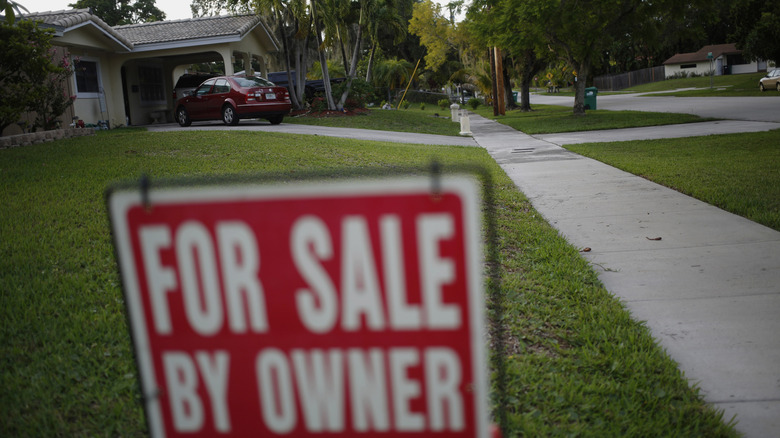What You Need To Know About Escalation Clauses When Buying A Home
Buying a home is fraught with all kinds of confusing jargon for the first-time home buyer and even those who have done it before. Escrow accounts? Mortgage insurance? Closing costs? What does it all mean? One phrase you may hear thrown around in the context of home offers and bidding wars that sounds particularly intense is the escalation clause. As if the home purchasing process isn't stressful enough — now there's a scenario where the situation can escalate?
The truth is, escalation clauses aren't nearly as scary as they sound. If you know how to use an escalation clause effectively and have a savvy real estate agent, it can give you quite an edge over other buyers when making an offer on a property, as Realtor explains. Far from escalating the anxiety of buying a home, they can streamline the process and make the whole situation more straightforward in the end.
Definition of an escalation clause
An escalation clause is a clause a prospective home buyer can include in their offer to the seller in the real estate contract, as Realtor reports. People may also refer to the escalation clause as the "escalator." It typically states the buyer's offered purchase price for the home, along with a sentence saying that if the seller receives a higher offer than the buyer's price, they are willing to increase their offer price up to a certain point.
The escalation clause can dictate how much a buyer is willing to increase their offer, both in steps and in terms of the final price a buyer is willing to pay, as My Home by Freddie Mac explains. For example, a buyer may make an offer on a home for $375,000 but stipulate in their escalation clause that they will outbid competing offers by $10,000, up to a final purchasing price of $400,000. So, if another prospective buyer makes an offer on the home for $380,000, the first buyer would automatically be committed to beating their offer out by $10,000 and paying $390,000 for the home.
But, if another shopper makes an offer for $395,000, a $10,000 increase on that bid would be $405,000, which is over the first buyer's budget; therefore, they would lose out to the competitor. An escalation clause can never make a prospective buyer pay more than they have stipulated in the offer.
When an escalation clause can be useful
According to Harvard Business School, the United States continues to have one of the hottest real estate markets in history, setting records not only in terms of the number of houses sold per year but also in regard to the number of homes available for sale, which was at an all-time low in December 2021. This high demand for residential properties and its low inventory makes buying a house, particularly one in a desirable neighborhood, extremely competitive. Escalation clauses are helpful for buyers to use in these kinds of markets, as they require a buyer to predetermine how they will address any competition when they make an offer on a home.
Escalation clauses can also help prevent buyers from engaging in a bidding war. In a bidding war, as defined by Investopedia, buyers compete with each other to submit higher and higher offers on the house until one backs down. With an escalation clause, you do not need to worry about constantly trying to figure out your next offer move. You have already defined the scope of how much you are willing to pay for the house, and the terms of the clause will dictate if you outbid or lose out to other prospective buyers.
How escalation clauses impact buyers
Escalation clauses can positively impact a home buyer's chances of getting their offer accepted by the seller, as explained by Realtor. First, an escalation clause demonstrates to the seller that a buyer is highly interested in purchasing their home and is serious about making an offer. This perception can differentiate a buyer from other offers and may make a seller give them a second look, even if they are offering a price lower than the others. Sellers do not want to deal with the complications of a buyer potentially pulling out of a sale before it is completed. Hence, they prefer buyers with a demonstrated commitment to their property.
An escalation clause also potentially pigeonholes the seller. If they do not receive any other offers higher than the one the buyer made in their escalation clause, they can't ask the buyer for more money. Admittedly, a situation with no competing offers is rare in today's hot housing market. However, it could still happen, and then the buyer would move forward with purchasing the home for their initial offer price.
How escalation clauses impact sellers
Escalation clauses significantly streamline the process of selling a home and can make the whole experience much easier for a seller, Realtor reports. An escalation clause in an offer contract essentially lays all of the buyer's cards on the table, and the seller knows how far they are willing to go to secure their property. It also gives the seller a chance to get started on the contract paperwork if they are going to move ahead with the buyer's offer since there will be no further negotiation. And of course, any time an escalation clause is included in an offer contract, there is always the potential for the seller to make quite a bit more money if they do receive competing offers on their home.
There are some drawbacks for sellers in working with escalation clauses, though. A big one is the risk of the appraisal coming up short. If an escalation offer results in a buyer offering a higher price than the home is appraised for, the buyer's mortgage lender may refuse to lend money for more than the home's appraisal price. If the buyer doesn't have the cash to make the difference, the offer will fall through, and the seller will be back on the market, starting the whole process from square one.
How escalation clauses and offer reviews are related
It can be a strategic decision for a buyer to include an escalation clause in their offer letter. However, depending on the seller's offer review process, an escalation clause can also come back to bite a buyer later, as Realtor reports. Many sellers use what is known as a specific day offer review, in which they announce that a property will go on the market on a specific date, and all offers will be reviewed on another. The seller will make their decision on the offer review date. Specific day offer reviews are an example of a situation where an escalation clause could give buyers an edge over their competition because all offers will stop at a predetermined time.
In contrast, escalation clauses can be somewhat of a liability in a "highest and best" offer review. For the highest and best bids, sellers will collect offers on a property for a certain period. They will then reach out to the buyers with the best offers and ask them to send in their highest and best bids to top the offers that have already been made. If a buyer has submitted an escalation clause as part of their offer, the seller knows how much they will ultimately pay for the property. There is no law preventing the seller from telling all of the other buyers about the top offer in the escalation clause and inviting them to beat it.





